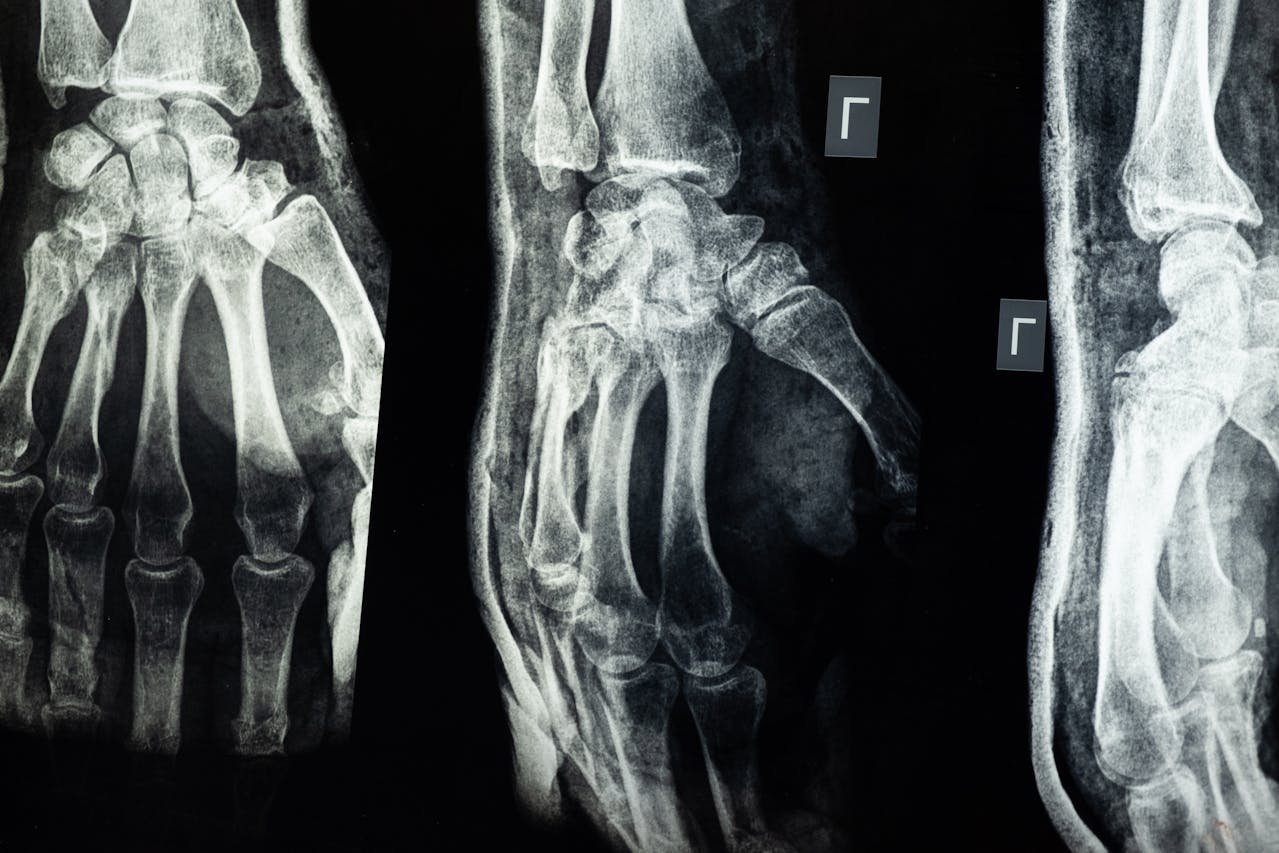Strong Bones
Building healthy bones is extremely important, especially as we age. Our once strong bones weaken over time, leading to reduced bone density. Consequently, the degenerative effects of aging can create various problems for the skeletal system. Additionally, a deficiency in calcium can result in rickets in children and osteoporosis in older adults.
To promote good bone health, it is essential to consume sufficient amounts of calcium and Vitamin D, which enhances calcium absorption. Fortunately, adopting certain nutritional and lifestyle habits can help build and maintain strong bones as you grow older.
To achieve healthy bones, prioritize foods rich in specific nutrients. Incorporating these nutritious options into your regular diet will help keep your bones strong and resilient. Here are some of the best foods for bone health.
1. Dairy Products
When discussing bone health, dairy products like milk, yogurt, and cheese often take center stage. This is because these foods are rich in bone-building calcium and vitamin D. According to the National Institutes of Health (NIH), these nutrients are essential for maintaining strong bones and teeth, as they significantly contribute to bone strength and structure.
Yogurt is a particularly rich source of probiotics, calcium, potassium, and vitamins D, A, and folate. Consuming yogurt daily can help prevent fractures; just one bowl can provide about one-third of your daily calcium requirement and one-fifth of your daily vitamin D requirement.
Milk is another excellent choice, offering calcium, phosphorus, potassium, and vitamins A and D. Drinking three glasses of milk a day can fulfill your daily calcium needs.
Cheese is also an outstanding source of vitamin A, vitamin B12, zinc, calcium, and phosphorus. Regular consumption of cheese can help protect your bones from becoming brittle; eating just one slice daily can significantly boost your intake of calcium and vitamin D.
Ultimately, your choice between full-fat and non-fat dairy products depends on your personal preferences and dietary goals. If you’re looking to lose weight, opting for lower-fat or non-fat options is advisable. However, be mindful to include foods fortified with fat-soluble vitamins like vitamin A and vitamin D, which are crucial for building strong bones, as these vitamins are removed from non-fat dairy products.
2. Leafy Greens
Dark leafy greens, such as spinach, kale, Swiss chard, and collard greens, are packed with calcium and magnesium, both of which are excellent for bone strength. Additionally, they provide vitamin K, an essential nutrient for bone mineralization. These nutrients not only support bone density but also play a crucial role in overall bone health. Furthermore, dark leafy greens are rich in vitamin C, which stimulates the production of bone-forming cells and may help protect bone cells from damage. Incorporating these nutrient-dense greens into your diet can significantly enhance your bone health.
3. Fatty Fish
Fatty fish, including salmon, sardines, mackerel, tuna, and rainbow trout, are rich sources of vitamin D and omega-3 fatty acids. Vitamin D plays a vital role in calcium absorption, while omega-3 fatty acids help reduce inflammation in the body, promoting overall bone health.
Vitamin D, often referred to as the “sunshine” vitamin, is a fat-soluble vitamin crucial for bone growth and remodeling. According to the National Institutes of Health (NIH), vitamin D supports the gut’s ability to absorb calcium. While exposure to sunlight can trigger vitamin D production in the skin, factors such as skin type and geographical location may limit your sun exposure. Therefore, it’s essential to focus on obtaining adequate vitamin D from dietary sources. Fatty fish are among the best food sources of this important vitamin, as noted by the USDA.
Additionally, fatty fish like salmon also contain calcium, which is vital for maintaining healthy bones. A 3-ounce serving of salmon provides about 180 mg of calcium, further contributing to your bone health.
4. Nuts
There are plenty of nut varieties to choose from, including almonds, cashews, walnuts, peanuts, tiger nuts, pecans, and Brazil nuts. These nuts are rich in calcium, magnesium, phosphorus, and other nutrients that support bone health.
First, magnesium aids in the absorption and retention of calcium in the bones. Additionally, phosphorus is a crucial component of bone structure, with approximately 85% of the body’s phosphorus found in the bones, according to the National Institutes of Health (NIH).
For example, a half-cup of almonds provides 190 mg of calcium, while just two tablespoons of almond butter offer about 111 mg of calcium. Moreover, almond butter is rich in protein, contains healthy monounsaturated fats, and has no cholesterol.
You can enjoy almond butter spread on whole-grain bread, paired with banana slices, or used as a dip for apple slices, making it a delicious and nutritious addition to your diet.
5. Seeds
Seeds such as chia seeds, flaxseeds, pumpkin seeds, and sesame seeds are excellent sources of calcium, magnesium, and phosphorus, all of which support bone health.
In addition to these essential minerals, seeds are rich in fiber and omega-3 fatty acids. These nutrients can help lower bad cholesterol levels, reduce inflammation in the body, and ensure that your brain and nervous system function smoothly.
To incorporate these nutritious seeds into your diet, consider adding them to your favorite salads or juices. You can also mix them into your next smoothie or include them in your baking projects for an extra boost of nutrition.
6. Orange Fruits
Orange fruits are rich in vitamin C, which plays a vital role in collagen production, helping to maintain the integrity of teeth and bones. While a freshly squeezed glass of orange juice may not provide enough calcium to meet the daily recommended intake, many fortified orange juices contain added calcium, vitamin D, potassium, and folate, along with other nutrients beneficial for bone health. This makes fortified orange juice a great option for enhancing your nutritional intake and supporting your bone health.
7. Lean Meats And Poultry
Beef, chicken, and turkey are excellent sources of protein, which is essential for maintaining healthy bones and teeth. In addition to protein, these meats contain phosphorus, zinc, and other minerals that are crucial for bone health. Incorporating these lean meats into your diet can help support bone strength and overall skeletal health..
8. Whole Grains
Whole grains, such as brown rice, quinoa, and whole wheat bread, are rich in nutrients like magnesium, phosphorus, and B vitamins, all of which contribute to strong teeth and bones. Incorporating these whole grains into your diet can help support your overall dental and skeletal health, providing essential minerals that promote bone density and strength.
9. Eggs
Eggs are a rich source of protein and vitamin D, with the yolks providing a significant amount of fat-soluble vitamins, including vitamins D, A, E, and K. The protein in eggs supplies essential amino acids that support bone health, while vitamin D plays a crucial role in calcium absorption. It is important to note that the vitamin D in eggs is found only in the yolks. Incorporating eggs into your diet can be an effective way to enhance your nutrient intake for better bone health.
10. Beans And Legumes
Beans and legumes are powerhouse plant foods packed with bone-friendly nutrients. Varieties such as black beans, edamame, pinto beans, kidney beans, lentils, and chickpeas are excellent sources of calcium, magnesium, phosphorus, and protein, providing essential nutrients for bone formation and strength.
Additionally, beans and legumes are high in fiber and protein, making them an excellent choice for those following a plant-based diet. Incorporating these foods into your meals can help you meet the daily calcium target of 1,000 to 1,300 milligrams (mg), depending on your sex and life stage, as recommended by the National Institutes of Health (NIH).
11. Prunes and Dried Fruits
Prunes are rich in vitamin K and boron, both of which are crucial for maintaining bone health. Additionally, dried fruits can provide various bone-friendly nutrients; for example, two figs contain about 65 mg of calcium.
You can enjoy figs in many ways: slice them to add to oatmeal, mix them with cheese, top your pizza, or blend them into smoothies for a nutritious boost. Incorporating these dried fruits into your diet can significantly enhance your bone health.
12. Fortified Foods
If your body cannot tolerate dairy products, you can fill the nutritional gaps by incorporating foods fortified with calcium and vitamin D. Fortified foods, such as cereals, whole grains like amaranth and oats, plant-based milk alternatives, and juices, are enriched with these vital nutrients, making them excellent choices for bone health—especially for those with lactose intolerance or dairy allergies.
For instance, milk made from almonds, rice, or soy is often fortified to provide calcium levels comparable to those found in dairy products. According to the USDA, one cup of Raisin Bran cereal offers calcium and vitamin D, while 8 ounces of almond, rice, tiger nut, or soy milk can provide approximately 350 to 400 mg of calcium. Additionally, an 8-ounce serving of calcium-fortified orange juice can serve as a rich source of both calcium and vitamin D. Incorporating these fortified options into your diet can help support your bone health effectively.
13. Regular Exercise
Engaging in specific types of exercise, particularly weight-bearing activities such as walking, jogging, and resistance training, is essential for building and maintaining strong bones and bone density.
Weight-bearing or high-impact exercises promote the formation of new bone, help prevent bone loss, and increase bone mineral density, strength, and size in both younger and older women.
Additionally, elderly individuals who participate in weight-bearing exercises demonstrate improvements in bone density, along with reductions in bone turnover and inflammation. Incorporating these exercises into your routine can significantly enhance your overall bone health at any age.
14. Vegetables
Vegetables are excellent for bone health as they are rich sources of vitamin C, which stimulates the production of bone-forming cells. Additionally, vitamin C’s antioxidant properties may protect bone cells from damage.
Incorporating vegetables into your diet can also increase bone density, which measures the amount of calcium and other minerals present in the bones. Low bone density can lead to conditions such as osteopenia (low bone mass) and osteoporosis (brittle bones).
A high intake of colorful vegetables, including red, green, and yellow varieties, can enhance bone mineralization during childhood and help maintain bone mass in young adults.
Moreover, consuming plenty of vegetables is particularly beneficial for elderly individuals, as these foods can reduce the risk of osteoporosis and decrease bone turnover. Increased bone turnover, the process of breaking down and forming new bone, is a significant risk factor for osteoporosis in older adults. Therefore, prioritizing vegetable intake can significantly support bone health throughout life.
15. Consume Protein Rich Foods
Getting adequate protein is vital for your bone health, as approximately 50% of your bone structure is composed of protein. Low protein intake can lead to decreased calcium absorption and negatively impact the rates of bone formation and breakdown.
Research shows that individuals who consume higher amounts of protein tend to have better bone density in the hip, spine, and overall body, along with a lower risk of forearm fractures. Therefore, ensuring sufficient protein intake is essential for maintaining strong and healthy bones.
16. Cruciferous Veggies
Cruciferous vegetables such as arugula, turnip greens, kale, cabbage, and broccoli provide several nutrients that support bone health, including vitamin K and calcium. These two nutrients work together to strengthen and build healthy bones.
Additionally, cruciferous vegetables are excellent sources of bone-friendly vitamin A and magnesium, which further enhance bone strength alongside calcium.
For example, broccoli is particularly rich in calcium, vitamin C, potassium, phosphorus, folate, and vitamin K. Consuming these vegetables daily can significantly contribute to maintaining strong bones. You can easily incorporate these versatile cruciferous veggies into your diet by adding them to soups, salads, and a variety of other dishes.
Bottom Line
Bone health is crucial at all stages of life. Many people tend to take strong bones for granted, as symptoms of bone problems often do not manifest until significant bone loss has occurred.
Fortunately, maintaining a balanced diet rich in a variety of nutrient-dense foods, along with a healthy lifestyle that includes regular exercise and the avoidance of excessive alcohol and tobacco use, is essential for supporting bone health.
If you have specific concerns or dietary restrictions, consulting with a healthcare professional or registered dietitian for personalized advice is a wise decision. They can help tailor a plan that meets your individual needs and promotes optimal bone health.
Source
- Lauren Bedosky and Kara Andrew. August 21, (2023). The 7 Best Bone-Building Foods. https://www.everydayhealth.com/diet-nutrition/7-best-bone-building-foods/.
- Franziska Spritzler March 22, (2023). 10 Natural Ways to Build Healthy Bones. https://www.healthline.com/nutrition/build-healthy-bones.
- Maureen Salamon. January 1, (2023). Surprising foods that boost bone health. https://www.health.harvard.edu/womens-health/surprising-foods-that-boost-bone-health.
- Alex Fulton and Stacey Feintuch. March, 09 (2022). 8 Foods to Eat for Healthy Bones. https://www.google.com/amp/s/www.healthywomen.org/amp/8-foods-to-eat-for-healthy-bones-2656897560.
- Nikita Toshi. Aug 4, (2023). 10 Food For Strong & Healthy Bones. https://pharmeasy.in/blog/foods-for-stronger-bones/
- Jill Carnahan, Charushila Biswas, Ravi Teja Tadimalla, and Sindhu Koganti. Aug 3, (2023). 11 Best Foods For Building Strong Bones And Muscles. https://www.stylecraze.com/articles/foods-to-eat-for-healthy-bones/.






Pingback: 18 Superfoods for Natural Kidney Detoxification